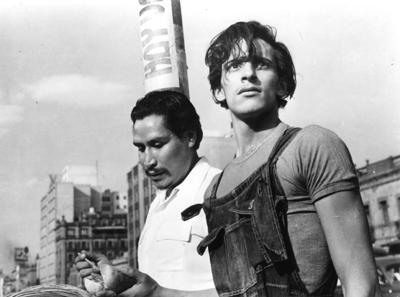|
Reviews of Recent Independent, Foreign, & Documentary Films in Theaters and DVD/Home Video
LOS OLVIDADOS (1950)
The story of juvenile delinquents in a big city slum has been used and abused frequently in just about every type of genre. But in 1950 Mexico - and Latin America in general - filmmakers shied away from this harsh reality. Not surprisingly, Los Olvidados (The Forgotten) lasted not even a week in Mexico. It was only after winning the best director award at the 1951 Cannes Film Festival that the film really took off. More than 50 years later, it has been re-released in a new 35mm print with an alternative ending.
The film is well paced, and at times full of suspense, with many well-developed subplots: the plight of Ojitos (Little Eyes), the boy from the provinces abandoned in the city, and the exasperated mother struggling to feed her four children and unable to discipline her eldest son. With enough nuanced differences to depict individuals and not stereotypes, the youth are realistically depicted; their language and slang natural, their attitudes typically adolescent.
But the same cannot be said for other characters, such as a reform school director and a police officer. They are wooden and preachy. Their dialogue is more like spoken essays; i.e., youth require patience, parental love, and education. Though to be fair, the film starts with a warning voiceover explaining how the great cities of the world ignore the poor - an unsubtle manifesto for social and educational change. The musical score, theatrical and flamboyant, adds to this effect.
Nevertheless, Los Olvidados remains relevant with the power to shock. The ending, logical though tragic, gives the film poignancy, in ways the newly found alternate ending, shown immediately afterwards, does not. Shot by the producer, its more upbeat resolution contradicts the tone set by director Luis Bu˝uel. Roxana M. Ramirez, Peruvian laywer and journalist, formerly a member of the Peruvian Human Rights and Public Service Ombudsman
|
